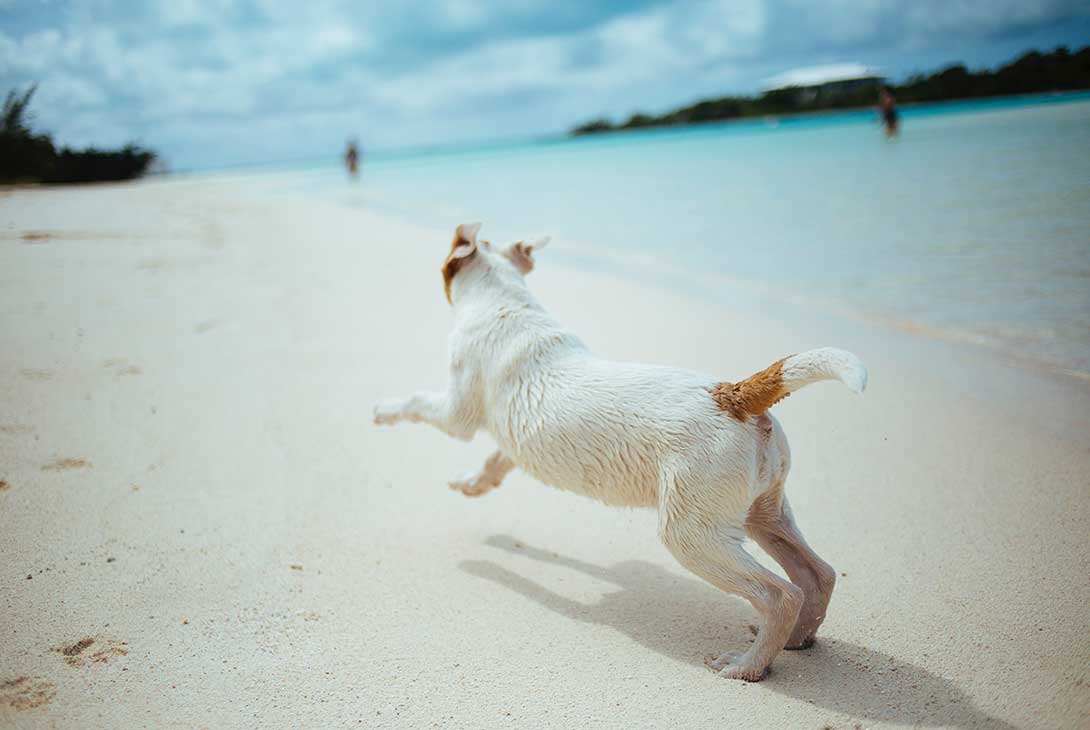
Beach Time
If you are living close to the beach or visit the beach regularly with your dogs then this month’s blog post is for you! Most dogs love a trip to the beach as much as we do so here are some things to be more aware of this year:

Pack the sunscreen
Apply prior to hitting the sand. The Dr Zoo Zinc-Free Suncream is the best as it stays on even in the surf. Be sure to re-apply every few hours. It is zinc-free which means it doesn’t matter if your dog licks it off! Living outdoors in Australia, our dogs and cats are prone to sun-induced disorders such as solar dermatitis and skin cancers. It is imperative you treat their skin as you would yours so be sure to slip, slop, slap. Did you know you can even get sun visors for dogs to protect the skin around the eyes and nose if your dog lacks pigment there? Lack of pigment (or pink skin) means less melanin and less natural sun protection for your pet especially in areas of the body such as their underbellies which have thin fur. Staffordshire Terrier owners will know what I’m talking about here .. Staffy’s love to sunbake! So, ensure that they are getting a good amount of sunscreen on their undersides before heading out into the sun.
Ear Care
If your dog loves a swim then any moisture down the ear can set up an infection. Bacteria live in the ears and on the skin all the time but add water and heat and those little guys have an absolute field day ..look out! They thrive and replicate under these conditions and all they require is just a small amount of water to trickle down the ear canals on a hot day. Thoroughly dry your dog’s ears after a beach session and apply a gentle cleanser bought from your vet or pet store to prevent infections.
Skin and Coat
Give your dog a good hose off with fresh water after a beach session. The salt and sand can dry on the skin and cause irritations, redness and itchiness. Use the Dr Zoo range for the best results.

Salt Water Ingestion
This is one to beware off. Try to limit ball throwing into the saltwater as your dogs will run and catch it, they ingest a lot of water while doing so. This, in turn, may cause osmotic diarrhoea as the saltwater draws fluid out of the gut and into the stool. It can also cause excessive vomiting and even fluid in the lungs if your dog is a serial water runner whilst panting. Throw the ball on the hard sand instead.
Fishermans Friends
Every dog loves to have a good sniff of the fisherman’s bucket but be cautious as they are often quick to pick up a fish which means a potential fishhook injury. Some hooks are barbed which means they won’t come out easily and are extremely painful. These will require emergency surgery to remove and what was a nice morning at the beach soon turns out to be spent at the vet clinic. Also, be careful of walking over rock walls as dogs are prone to oyster shell lacerations in their paws. Especially the thin-skinned breeds such as whippets and greyhounds. Don’t let your dog pick up dead fish either… some fish are toxic such as the Puffer Fish that often get washed up on shores and when blue bottles are out in force these also cause issues if ingested.

Avoid Excessive Exercise
I might sound the grinch here but be careful! Dog’s can tear cruciate ligaments, snap their calcaneal tendon (Achilles tendon), stretch and tear the smaller ligaments around the toes and even worse. Puppies can also injure their legs by flying off sand dunes and sometimes so severely they need surgery on their little growing bones which can cause challenges later on in life. Not to mention stick injuries to the mouth and skin when running and chasing or leaping around. Sometimes it’s best for more controlled exercise or buy a long, extendable lead so they can still explore under guidance.
Hydration & Overheating
Take a water bottle with you and collapsible water bowl for your pet. Provide shade and call it a day if your dog is excessively panting or lethargic. Often by the time a patient ends up seeing us at the vet with heat stress, the damage has already started. Their internal organs literally ‘cook’ if their core temperature rises too high and prevention of this is way better than trying to cure it. Early signs of overheating are excessive panting or respiratory distress, brick red gums or tongue, excess salivation, restlessness or vomiting or diarrhoea. Get to your vet immediately if any of these signs occur.
Dr Zoo Products
Last but not least, fill your cupboard at home with a good range of the Dr Zoo products. Each one has a specific use especially for our pet’s living by the beach! From the Iirritable Skin Cream to the Bamboo brush and all the goodies in between. The Dr Zoo range has your pet covered paw to tail!
Happy Beach time!
